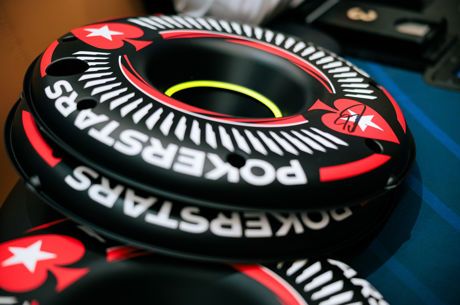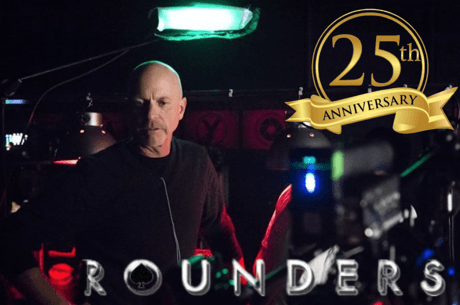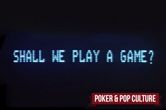Poker & Pop Culture: Poker in the Virtual Worlds of Non-Poker Video Games
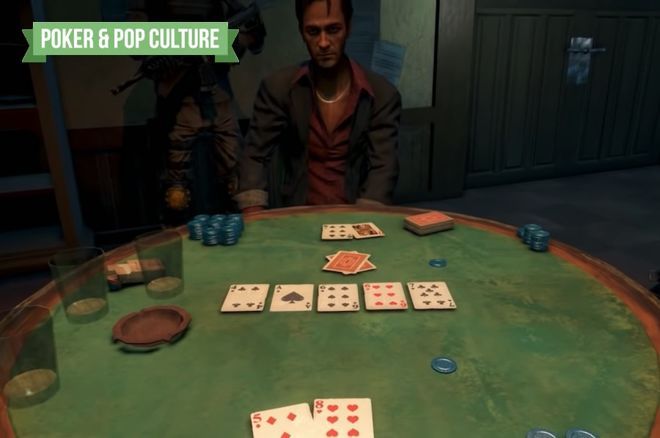
Table Of Contents
Last time I was sharing a discussion of the 1983 film WarGames that didn't quite make it into my book Poker & Pop Culture: Telling the Story of America's Favorite Card Game. That discussion is kind of an "outtake" from a chapter titled "Poker on the Computer" that covers early poker-playing programs, the creation of video poker, and of course the rise of online poker as an important part of the game's story and cultural influence.
Also not quite making it into that chapter were some examples of poker popping up inside of other video games — that is, non-poker video games in which the virtual "world" the player inhabits also includes either references to poker or even the ability to play poker within the game.
To me these examples are fascinating, not just because they show in another way how pervasive poker is in our culture, but because often the inclusion of poker in these games implies some sort of commentary about poker's significance, too. I wanted to share some of what I'm referring to — popular video games in which poker appears as a kind of "game within the game."
I should make one disclaimer (not unrelated to my decision not to explore this subcategory in the book). Being a few decades removed from the time in my life when I played video games most earnestly, I haven't myself played the games discussed below. That's not entirely true — I have played Grand Theft Auto before, but not very well. I was told at the time I was the only person ever to play the game who actually stopped at the traffic lights.
That means I'm primarily relying on others' descriptions of these games in order to comment on how they incorporate poker within the virtual worlds they create. That also means I might be unaware of other examples worth discussing either within these game franchises or elsewhere, so if you know of other interesting examples, please pass them on.
God Hand (2006)
God Hand is a 3D "beat 'em up" game originally released in both Japan and North America. The player is a martial artist who chooses various fighting moves as attributes then goes out and fights demons. The "God Hand," accessible after building up high enough on the "tension gauge," gives the player temporarily invicible powers.
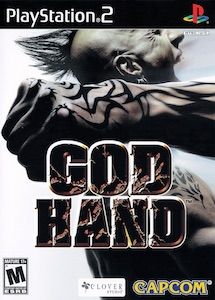
Essentially the player is constantly running around fighting everyone, with some comic elements such as a poison chihuahuas, giant power-providing strawberries, and the like.
In between the stages, players can linger and visit a kind of hub that includes a shop where they can buy new fighting moves, an arena in which to practice fighting, and a portal that leads to the next stage. Also included is a casino where they can play blackjack, slots, and poker. You can also bet on chihuahua racing.
There is an incentive to play the casino games, since there a player can earn money with which to buy more fighting moves.
The poker is actually video poker, and from what I can tell plays a lot like regular video poker, allowing players either to "bet" or "bet max" and offering payouts according to the rarity of hands. On the same "machine" you can play another card game ("high or low"), for some variety.
Poker is presented here as just another gambling game one finds in a casino, although as in real life, some knowledge of probabilities can help you whereas that isn't of much use when sitting at the slots.
Grand Theft Auto IV (2008)
Grand Theft Auto IV presented yet another entry (the 11th, in fact) in what was already a long-running action-adventure video game series, begun way back in 1997. Often the focus of criticism for glamorizing violence and criminal behavior, as well as perpetuating negative stereotypes, the "GTA" series is nonetheless one of the most commercially successful video game franchises of all time.
Like earlier GTA iterations, Grand Theft Auto IV similarly presents complicated "missions" through which the player — in this case a war veteran named Niko Bellic — has to progress, often while behind the wheel of vehicles with which the player can navigate the game's complicated, virtual world called Liberty City.
Among the places the player can visit in the city is an internet cafe where Niko can sit down at computers and surf something like 80 different websites, among them an online poker site rudely named "Poker in the Rear." (GTA has faced considerable censure for misogyny, too.)
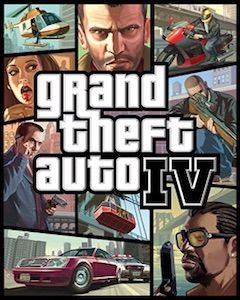
It's not really an online poker site on which Niko can play — just a home page with some tongue-in-cheek advertising of the site ("Just think how much you can lose on your lunch break!"). (If you're curious to read all the fine print, click here.) There's even a lengthy diatribe about the "new online gambling law" — clearly a reference to the Unlawful Internet Gambling Enforcement Act of 2006.
In that complaint about the new law, mention is made of poker frequently being on television. "Turn on your TV — The Venturas Poker Challenge is on all the time," it says, the point being that online poker shouldn't be legally proscribed given the game's prominence.
You can actually watch "The Venturas Poker Challenge" in GTA IV, a spoof of televised poker set in "Las Venturas" with commentators essentially mocking the whole idea of watching people play cards on TV.
"This is entertainment at its finest. This is sport at its best. This is human drama at its most humane and dramatic," says one of the hosts. "It's the fitness level of our biggest stars that make poker the incredible sport it has become.... They are not men. They are not women. No, they are gods," says the other.
The show helps clarify the game's cynical view of what was then a recent explosion in poker's popularity, especially online poker and poker on TV. Then again, there isn't much about which GTA isn't cynical.
Fallout: New Vegas (2010)
Fallout: New Vegas is another role-playing game involving lots of action, this time set in an imagined post-apocalyptic future.
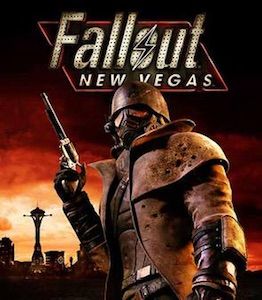
It's an entry in the Fallout series that like GTA was first introduced 1997, carrying the narrative of previous games forward to the year 2281 and relocating the story to the former city of Las Vegas, renamed "New Vegas." All of this is happening about two centuries after the original "Great War" back in 2077 that ended with a massive nuclear exchange.
As you might imagine, players are dropped down into the middle of warring factions into a situation in which they constantly have to fight to survive. Drawing on the Vegas setting, there are casinos players can visit and play various games, including blackjack, roulette, and slots.
Outside the casinos, there's another game players can play using the various currencies, a heads-up card game called Caravan. I won't try to summarize the game, but it does involve traditional playing cards, discarding and drawing, and betting as players "build decks" (rather than hands). The points system the game uses perhaps more resembles cribbage or even some of poker's precursors like the German game Poch.
Actually there's an earlier Fallout game — Fallout Tactics: Brotherhood of Steel (2001) — set in the midwest in which the player comes across a group of "Brahmin" playing poker in the desert. (I don't believe the player can actually join the game, though.)
Here including poker (or a poker-like game) adds further detail to the imagined "New Vegas" and its distant relationship to what pre-armageddon Las Vegas had been.
Far Cry 3 (2012)
This first-person shooter game takes place on a tropical archipelago situated between the Indian and Pacific Oceans. Vacationers are kidnapped by pirates, and the player — named Jason Brody — has to try to save his friends.
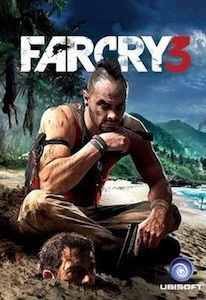
As Jason progresses through the game and the story's complicated plot he acquires additional fighting skills and weapons. Meanwhile there are actually several poker games taking place in secret rooms all over the two islands, and once he finds a game Jason is able to sit at the table and play four-handed no-limit hold'em for varying stakes. As with poker in other virtual worlds of video games, the money he wins is useful to him elsewhere in the game.
A while back our friends over at PokerListings wrote up some tips for those playing poker in Far Cry 3. It sounds like the idea is to play tight and then bet when you've got something, as the opponents are all a bunch of calling stations.
Here poker appears to function as additional element helping to flesh out the dangerous virtual world of the islands in Far Cry 3 populated by threatening, lawless figures.
Red Dead Redemption II (2018)
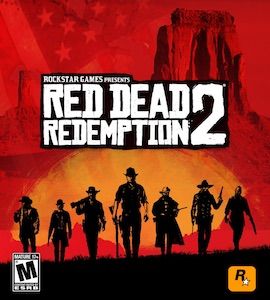
Speaking of poker being presented as a game for outlaws, last year's Red Dead Redemption II — an action-adventure game set in the Old West — follows the pattern established by endless movie westerns, television shows, novels, stories, and paintings by incorporating poker into the world it creates.
Part of the Red Dead series begun in 2004, this "prequel" to the earlier Red Dead Redemption presents numerous options for players trying to make their way through the wild and woolly west as the central protagonist, the outlaw Arthur Morgan.
PokerNews has already reviewed poker's presence in this game, including offering some strategy advice for how to win once you sit down to play a game of Texas hold'em. (That's an anachronism, by the way, as the game is set in 1899 and hold'em most certainly wasn't around just yet.)
For more on this one, check out "How to Win at Poker in Red Dead Redemption II."
Poker & Pop Culture: Telling the Story of America's Favorite Card Game will be published in both paperback and e-book versions in June 2019. Read more about the book — which is available for preorder — at D&B Poker.






